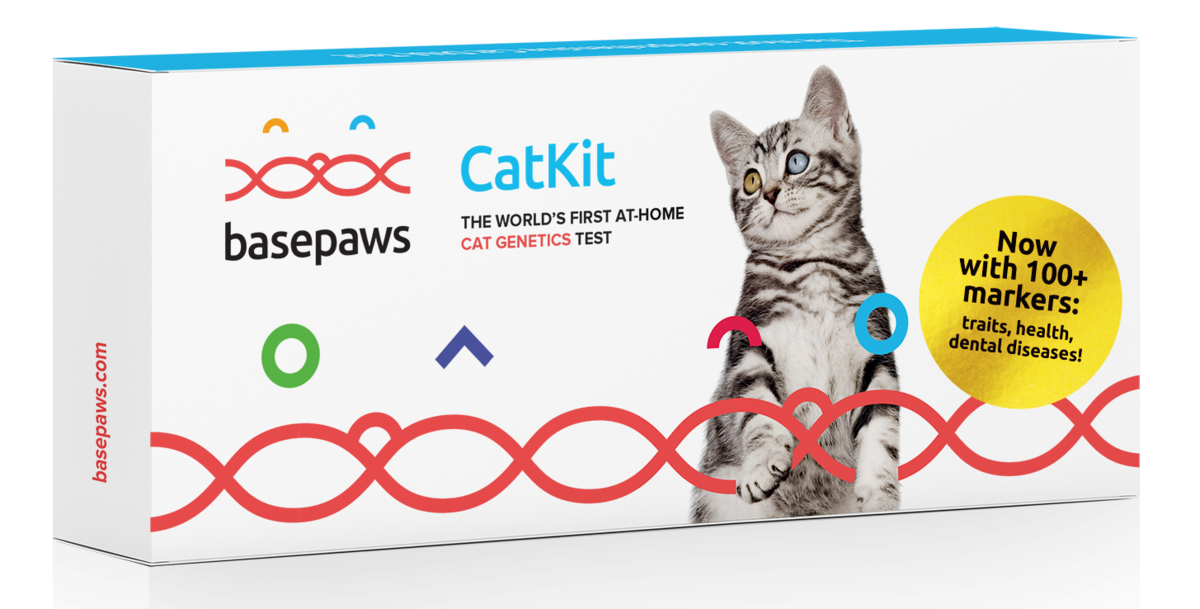
Launched in 2018, the Basepaws Cat DNA test became the first-of-its-kind. It was created to give pet parents the customized information that they need to better understand their cats, implement at-home routines targeted to their cats’ needs, and more effectively work with their veterinarians to plan an individualized proactive care regimen for their cats.
The Basepaws Cat DNA test is now the most comprehensive feline breed and health screening tool on the market. Details of the test’s upgraded features are included in the sections that follow.
New Genetic Health Markers and Blood Type Screening
The upgraded digital report will provide results for over 70 known feline genetic health markers, including new markers for hypertrophic cardiomyopathy (HCM), the most common form of heart disease in cats. While other companies test for the well known markers associated with HCM, Basepaws will be the very first to screen for additional, recently discovered HCM-related markers. Another new feature includes genetic markers for blood type. There are three different feline blood types, and certain blood types can be more common in some breeds and less common in others. Knowledge of a cat’s blood type can be helpful to the cat breeding process as well as support life-saving medical decisions, such as when a cat needs an emergency blood transfusion.
A cat’s risk for each condition or their carrier status for a specific disease-associated marker will still be included in the health markers section of the report. Genetic health marker screening helps a pet parent identify their cat’s current and/or future risk for a disease and can support preventative care planning with a veterinarian. For example, the cause of HCM is not fully understood, but it is a condition that tends to be more prevalent in certain breeds versus others. Similar to other conditions such as chronic kidney disease, many cats with HCM do not display symptoms until the illness reaches an advanced stage. Early detection of a genetic predisposition for HCM can be useful to a veterinarian’s diagnosis and treatment process to potentially decrease the chances that a cat will experience certain symptoms and increase the range of options available to support their overall health and wellbeing.
New Genetic Trait Markers
The Basepaws Cat DNA test analyzes your cat’s genetic similarity to the top 21 pedigreed breeds in the Basepaws reference panel. With this update, pet parents will also learn about some of the genes and mutations (alleles) that are responsible for observable traits (phenotypes) such as their cat’s coat color, coat pattern and texture, tail length, and other features that contribute to their unique physical appearance.
The new digital report will include trait markers associated with monogenically-defined breeds, such as the Scottish Fold and the Japanese Bobtail. Monogenic traits are phenotypes that typically stem from a single gene mutation. When we look at the entire genome of a cat (which includes all genes and genetic instructions), these trait-related genetic variants (markers) only account for a tiny percentage of a cat’s overall genetic makeup and, therefore, do not constitute a meaningful contribution to a cat’s genetic similarity to different breeds. Nevertheless, they are responsible for some distinct and unique aesthetic features that are often associated with certain breeds.
Scientific Evidence Grading System
Basepaws will now offer a new five-star scientific evidence grading system for every health and trait marker. Pet parents will now be able to judge the strength of the published scientific research that links a particular marker to a specific disease or trait.
Some research findings are more robust and conclusive than others. For example, studies that include larger sample sizes (a higher number of cats) can conduct analyses of greater statistical power, meaning that the results of these analyses can be interpreted with greater confidence than those of studies with small sample sizes. In other words, we can be more confident in the conclusions and interpretations of a study with 200 cats that identify, through different scientific methods, a relationship between a genetic variant and a specific disease or trait of interest. These findings would be considered more robust and conclusive than those from a study of only one cat that reports a relationship between a genetic variant and a specific disease or trait of interest.
Our scientific evidence grading system is as follows:





